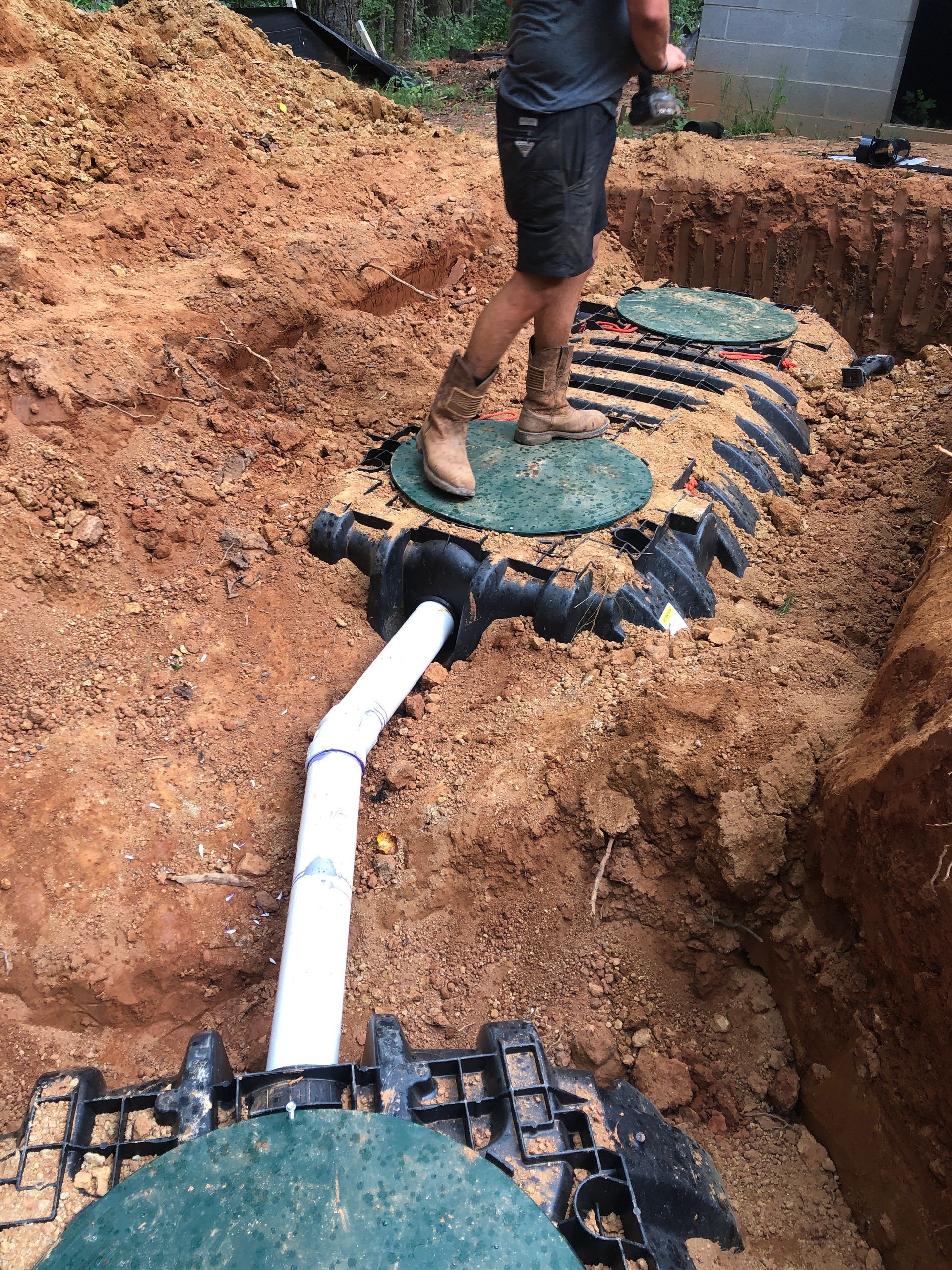Septic Installations in Eatonton, Georgia
A leaky, old, or inefficient septic system can cause many problems. It means health risks, environmental hazards, and property damage for homes and businesses. It's crucial to address these issues promptly.
At JC Siteworks & Septic, we specialize in installing new septic systems. With years of experience, we understand the challenges people face. Our team extends its helping hand to replace your old systems with new ones.
We have extensive knowledge of septic installations. We tailor our services to meet your needs, whether a small home system or a large commercial one.
If you need help with an old or inefficient septic system, let JC Siteworks & Septic provide a reliable solution. Contact us today to discuss your septic installation needs in Eatonton, Georgia.
Common Signs You Need an Installation
Frequent Repairs
Constant repairs signal a failing system. We assess whether a new installation is more cost-effective than ongoing repairs, offering long-term solutions.
Slow Drains
If sinks or toilets drain slowly, it could point to septic problems. Our team evaluates your system to determine if a new installation is necessary for improved efficiency.
Bad Odors
Unpleasant smells indicate septic malfunctions. We identify the cause of the odors and provide
septic system replacements to eliminate these issues.
Water Pooling
Water near the septic tank suggests leaks or overflows. We inspect the area for septic failures and offer robust installation services to resolve such problems.
Sewage Backup
This serious sign means the septic system is not functioning correctly. We provide urgent assessment and installation services to replace the inadequate system.
Get Reliable Septic Installation Services
New Installations
We install new septic systems for properties without existing setups. Our team ensures these installations meet your specific needs.
System Upgrades
For outdated or underperforming septic systems, we offer upgrade services. It improves efficiency and compliance with current standards.
System Replacements
We replace old, failing septic systems with new, efficient models. This service enhances system reliability and property safety.
Percolation Testing
Before installing a new system, we conduct percolation tests. It determines the soil's ability to absorb water, guiding system design.
Failure Evaluation
If your current system is failing, we evaluate the causes. Our findings help in planning the most effective replacement or upgrade.
Application Assistance
We assist with the necessary paperwork and applications for septic system installations. It includes permits and local compliance documents.
Soil Mapping
Our team conducts soil mapping to understand soil characteristics. This information is crucial for designing an efficient septic system in Eatonton, Georgia.
Permitting Services
We handle the permitting process for septic installations. It ensures that your new system complies with all local regulations.
Installation Maintenance Tips from JC Siteworks & Septic
- Have your septic system inspected regularly by us to identify and fix minor issues before they become significant problems.
- Septic tanks need pumping every few years to remove solids and prevent clogs. We can schedule regular pumping to keep your system running smoothly.
- Avoid flushing non-biodegradable items, harsh chemicals, or excessive grease. These can damage your septic system.
- Reduce water usage to prevent overloading the septic system. Fixing leaks and using water-efficient appliances can help.
- Remove the drain field from heavy vehicles, construction, and excessive water. This area is crucial for the system's function.
- Ensure everyone in your home knows what should and shouldn't go into the septic system.
- If you notice signs of a problem, like slow drains or foul odors, contact us immediately for a check-up.
Expert Septic Installation Services in Eatonton, Georgia
Keep your septic system in top shape with JC Siteworks & Septic. Call us to schedule your maintenance service. Let us help you extend the life and efficiency of your septic system.
FAQ's
How do I know if my property is suitable for a septic system?
Before installing a septic system, a percolation (perc) test is required to determine soil absorption rates. The system must be installed on well-draining soil away from water sources. Factors like property size, water table levels, and zoning regulations also play a role. JC Siteworks & Septic provides site evaluations to ensure compliance and efficiency, helping homeowners navigate permit requirements and choose the best system for their property.
What are the different types of septic systems available?
There are conventional gravity-fed systems, aerobic treatment units (ATUs), mound systems, and drip distribution systems. Conventional systems are common but require well-draining soil. ATUs use oxygen to break down waste and are ideal for smaller lots or high water tables. Mound and drip systems work well in challenging soil conditions. JC Siteworks & Septic assesses your needs to recommend the best option for long-term performance.
How long does a septic installation take?
A typical septic system installation takes between one to two weeks, depending on site conditions, permits, and weather. The process includes excavation, tank placement, drain field installation, and system testing. Delays can occur due to soil conditions or unexpected underground obstacles. At JC Siteworks & Septic, we streamline the process with efficient planning and communication to minimize disruptions to your property.
How much does a septic installation cost?
Costs vary based on system type, tank size, soil conditions, and permitting requirements. On average, a standard septic system costs $5,000-$15,000, while advanced systems like aerobic treatment units may cost more. While installation is a significant investment, a well-installed system lasts 20-40 years with proper maintenance. JC Siteworks & Septic provides transparent pricing and guidance to help homeowners choose cost-effective solutions.
What permits are required for a septic system installation?
Septic system installations require local health department permits, soil testing approvals, and possibly zoning clearances. Regulations vary by county, and failure to obtain proper permits can result in costly fines or system failure. JC Siteworks & Septic handles the permitting process for you, ensuring all necessary approvals are in place before installation begins.
Can I install a septic system myself?
While some property owners may consider DIY septic installation, it is not recommended due to complex regulations, excavation requirements, and potential health hazards. Improper installation can lead to system failure, groundwater contamination, and legal issues. Licensed professionals like JC Siteworks & Septic ensure your system meets all codes and functions efficiently, saving you money in the long run.
How do I maintain my new septic system?
Regular maintenance includes pumping the tank every 3-5 years, avoiding non-biodegradable waste, and preventing excessive water use. Drain field care is also crucial—keep heavy vehicles off and avoid planting deep-rooted trees nearby. JC Siteworks & Septic provides maintenance guidance and services to help homeowners maximize their system’s lifespan and efficiency.
What happens if my septic system fails?
Septic system failures often result in slow drains, sewage backups, foul odors, or pooling water near the drain field. Causes include clogged pipes, system overload, or soil saturation. Early intervention is key—neglecting repairs can lead to groundwater contamination and expensive replacements. JC Siteworks & Septic offers diagnostics and repairs to restore functionality and prevent future failures.
What are common misconceptions about septic systems?
Many homeowners believe septic systems require no maintenance, but regular pumping and inspections are essential to prevent failures. Another myth is that septic additives eliminate the need for pumping—while additives can aid bacterial balance, they do not replace routine maintenance. JC Siteworks & Septic educates homeowners on best practices to ensure system longevity.
Can I install a septic system near a well or body of water?
Most regulations require septic systems to be installed at least 50-100 feet away from wells, lakes, or streams to prevent contamination. High water tables can also impact system design, requiring advanced treatment options. JC Siteworks & Septic ensures your system meets safety and environmental standards to protect water sources.


